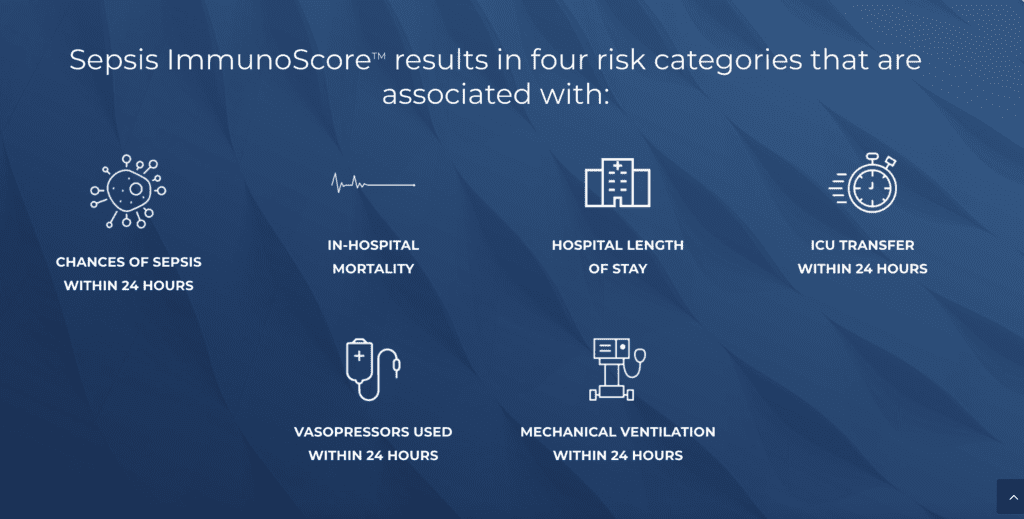Sepsis is a critical condition that challenges healthcare systems worldwide and claims the lives of millions annually. Introducing an innovative AI diagnostic tool, the Sepsis ImmunoScore may help. The FDA’s recent authorization of this groundbreaking technology signifies a major leap forward, offering hope and a new standard in predictive healthcare.
Table of Contents
- Introduction to the Sepsis ImmunoScore
- The FDA’s Green Light: A Milestone for Sepsis Detection
- The Power of AI: Unpacking the Sepsis ImmunoScore
- Sepsis: The Silent Menace
- Empowering At-Risk Groups with Advanced Detection
- Beyond Sepsis: Shaping the Future of Precision Medicine
- Conclusion
- FAQ
Introduction to the Sepsis ImmunoScore
The Sepsis ImmunoScore, developed by Prenosis, embodies the pinnacle of AI-driven diagnostics in the healthcare sector. Bobby Reddy, Jr., Ph.D., co-founder and CEO of Prenosis, hailed the FDA authorization as a “landmark event,” underscoring its significance for anyone at risk of sepsis. This tool’s unique combination of advanced algorithms and healthcare insight heralds a new era in the timely and accurate diagnosis of sepsis.
The FDA’s ImmunoScore Green Light
Prenosis, the company developing this technology, recently announced that the FDA has granted marketing authorization for the Sepsis ImmunoScore. This pivotal decision paves the way for a transformative approach to diagnosing and assessing the risk of sepsis. The emergence of this technology promises a brighter future for patient care in emergency and hospital settings.
The Power of AI: Unpacking the Sepsis ImmunoScore

The Sepsis ImmunoScore is a sophisticated AI-driven solution that integrates into electronic health records. By analyzing a complex array of 22 individual biomarkers and patient parameters, the tool delivers diagnostic and predictive insights on the presence or progression of sepsis within a critical 24-hour window. Its ability to generate a risk score and categorize patients into four discrete risk levels. It offers clinicians an unparalleled depth of understanding, facilitating informed decisions on patient care and potential ICU admissions. This level of precision in risk assessment for deterioration, in-hospital mortality, and care escalation is a testament to the predictive power of the ImmunoScore.
Sepsis: The Silent Menace
Sepsis remains a formidable challenge in healthcare, often presenting vague symptoms that can delay diagnosis and treatment. The ImmunoScore represents a beacon of hope in this landscape, where timely intervention can drastically alter outcomes. It promises to enhance early detection and personalize treatment plans, thereby significantly reducing the sepsis mortality rate.
Empowering At-Risk Groups with Advanced Detection
The introduction of the Sepsis ImmunoScore is particularly useful for at-risk populations. It can raise the alarm for vulnerable patients, including the elderly, immunocompromised individuals, and those with chronic conditions like diabetes, cancer, lung disease, and kidney disease. The ImmunoScore can mean the difference between a rapid, targeted response or a potentially fatal delay for these groups. If it can improve patient outcomes, it underscores the tool’s importance in proactive healthcare management.
Beyond Sepsis: Shaping the Future of Precision Medicine
The implications of the Sepsis ImmunoScore extend far beyond the immediate detection and management of sepsis. It is hopefully the first of many AI-driven diagnostics that can revolutionize healthcare. This exciting new tool offers a glimpse into a future where precision medicine is the norm. By leveraging advanced technologies like the ImmunoScore, healthcare professionals can unlock valuable insights.
Conclusion
By harnessing the power of AI, the ImmunoScore sets a new standard for early detection and risk assessment. It is a promising development in the push to save lives and improve outcomes for millions at risk of this deadly condition. As we look to the future, the potential of AI-driven diagnostics like the ImmunoScore to transform healthcare is immense. It heralded a new era of personalized medicine and improved patient care.
FAQ
Q1: What is sepsis? A1: Sepsis is a life-threatening condition triggered by the body’s response to an infection, leading to organ dysfunction.
Q2: How does the Sepsis ImmunoScore work? A2: The Sepsis ImmunoScore uses AI to analyze 22 biomarkers and patient parameters, providing diagnostic and predictive information about sepsis within 24 hours.
Q3: Who can benefit from the Sepsis ImmunoScore? A3: It’s particularly beneficial for at-risk groups, including the elderly, immunocompromised, and those with chronic conditions.
Q4: How significant is the FDA’s authorization of the Sepsis ImmunoScore? A4: It’s a landmark event, signaling a major advancement in the early detection and management of sepsis, with the potential to save countless lives.
Q5: What does the future hold for AI in healthcare? A5: AI like the ImmunoScore is paving the way for precision medicine, offering personalized therapeutic strategies and enhancing patient care.
Check out our other articles!
Artificial Intelligence in Cardiology: The AHA’s Guidance on AI’s Role in Cardiology
Ai in Primary Care with Google’s AMIE: The PCP of the Future
Artificial Intelligence and Solving Medical Error: Why AI is Important in Healthcare
Harnessing AI: Large Language Models Transforming Healthcare Delivery
Can AI Save Science? Healing the Wounds of Academic Publishing










